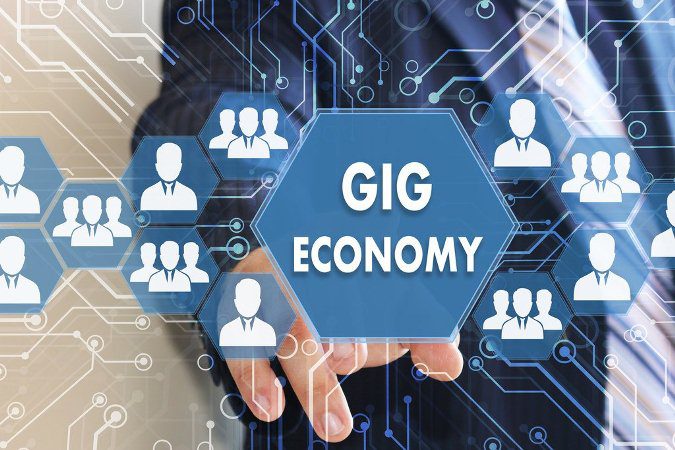The concept of work is experiencing an unprecedented seismic shift. The demographic change, craving for higher cognitive ability and increase in automation have given emergence to many new business models. The emergence of GIG economy is one of the most important and rising trends; also known as the “flex economy” or “mobile economy.”
Shift in GENERATIONAL workforce + Increased GLOBALIZATION + SMARTPHONES = The Gig Economy
The Gig Economy is based on convenience with instant access to products and services. Its win-win for both the parties. For example, it helps a busy new mummy who could possibly work few hours/days only; aspiring / struggling actor who needs flexibility to attend an audition, as well as, have his bills paid; for an adult who needs to take care of ageing parents and be at home; for a committed hardworking worker who wants to earn more.
Benefits for emergence of GIG workers and adoption by organizations could be summarized in the table below:
| GIG workers | Companies/Org |
| Autonomy and flexibility – Be your own Boss | Significant cost savings and no long-term commitment |
| Increased learning | Flexibility of seasonal and ad-hoc work |
| Choice and satisfaction of assignment | Buy Vs Build – Expertise |
| Work life Balance | Effective delivery/value added-driven Contract, |
| Meeting the capability Gap in Region |
The Gig Economy which is still at its nascent stage will soon be an extremely significant contributor to the labour market and its available talent pool. According to Deloitte, “more than one-third (34 percent) of all workers in the United States are contract workers and more than half (51 percent) of our respondents say their need for contingent workers will keep growing over the next three to five years.”
Due to the emergence of GIG economy, among several challenges faced by an organization (like how do we engage them, how do we ensure onboarding is quick while assuring assimilation to organization culture etc.) one of the most pertinent questions staring at us is ‘How do we meet this Gap purely from a performance management perspective?’
Post the internet era (late 90’s and early 2000), the technological advances and subsequent extinction of products launched at a much faster pace, the companies went about evolving their processes and annual appraisals with long-term perceptions started to be questioned. The Industry soon realized that performance feedback which was given once in a year was not adding value to employees. The changing profile of employees were also looking at quick and continuous feedback. Initially it was a herculean task to equip the managers to give continuous feedback and no longer rely on 1 conversation. This was needed since employees could do a course correction, fail fast and learn faster.
Below are some aspects that need to be included /embedded in managers to help manage performance in a GIG economy
Involvements Breeds Commitment
The first step is to share the context of work. Explaining to the contingent worker as to how his role/deliverables fit the overall strategy of the company. In line with the regular workforce, ensure that we invite them to critical meetings and deliberations. This kind of involvements would increase the commitment towards an assignment and ensure that delivery is aligned to the overall project agenda/theme
Coaching
One of the output of traditional performance management was to provide feedback, given the current context the traditional role of manager will be effectively made redundant. The GIG workers are expected to be self-sufficient and self-driven. In this scenario, the manager’s role will be more to support the team from (technical) an architecture perspective and be a COACH.
We have several examples of companies that have invested significantly in initiative that sharpen managers’ coaching skill/ability (if not specifically keeping in mind the GIG economy). There are companies that have engaged with full-time coaches to help managers learn and implement these skills. These full-time coaches would support the managers initially during the deployment phase. We all have heard stories of managers taking up individual developer’s role since they realized that coaching was difficult for them. Coaching will be a central to manager’s role in the days to come.
Two-way Feedback & Invest in Them
GIG economy would constitute a large number of Millennials and Gen Ys. They look for companies that invest in them by providing challenging learning opportunities; Training on latest technology, enable them with supportive and approachable leaders, recognition of efforts and early exposure to the entire job has to offer. In return, they are ready to work hard, longer hours and are committed to the work rather than the organization.
Assertiveness and Communicate to impact
Developers in yesteryears had the cushion to work in silos and not communicate with other stakeholders since the managers were insulating them. Even if the developer would have certain challenges, they would rely on managers to communicate / be the spokesperson. The GIG workers will be required to be assertive and standup if they wish to be successful. How can companies start investing to help GIG workers build “assertive/communication” as a key basic skill?
This skill is also an input towards the two-way feedback that we discussed above. Companies have created platform where continuous feedback is provided by peers and it is consolidated for managers. Currently these platforms are used only for Full time employees will have to be leveraged to building skills for Gig Workers
Learning
The traditional method of manager identifying the training needs as part of performance management process, nominating employees will soon be replaced with peer learning and recommendation methods. The HCM products of some of the leading companies have built-in functionality for these companies. The peers recommend the training modules and provide their ratings and comments. The manager nominated trainings will start to see a downward slope. Currently these platforms which are used only for fulltime employees will have to be leveraged for building skills for Gig Workers
Challenge Continues…. Let’s be pragmatic, not all Jobs and roles will be moving at a rapid pace. Several roles and jobs will be predominantly very rules/regulation and compliance based. In such scenarios, Gig workers may not be effective.
Going forward, given all of above, HR functions for most of its part will require upskilling and upgrading which means that unlearn and relearn will be the key focus.
Bibliography- deloitte, cleverism, forbes, pmi, hbr, williams-kent, sagepeople, hrexecutive and peoplematters.









